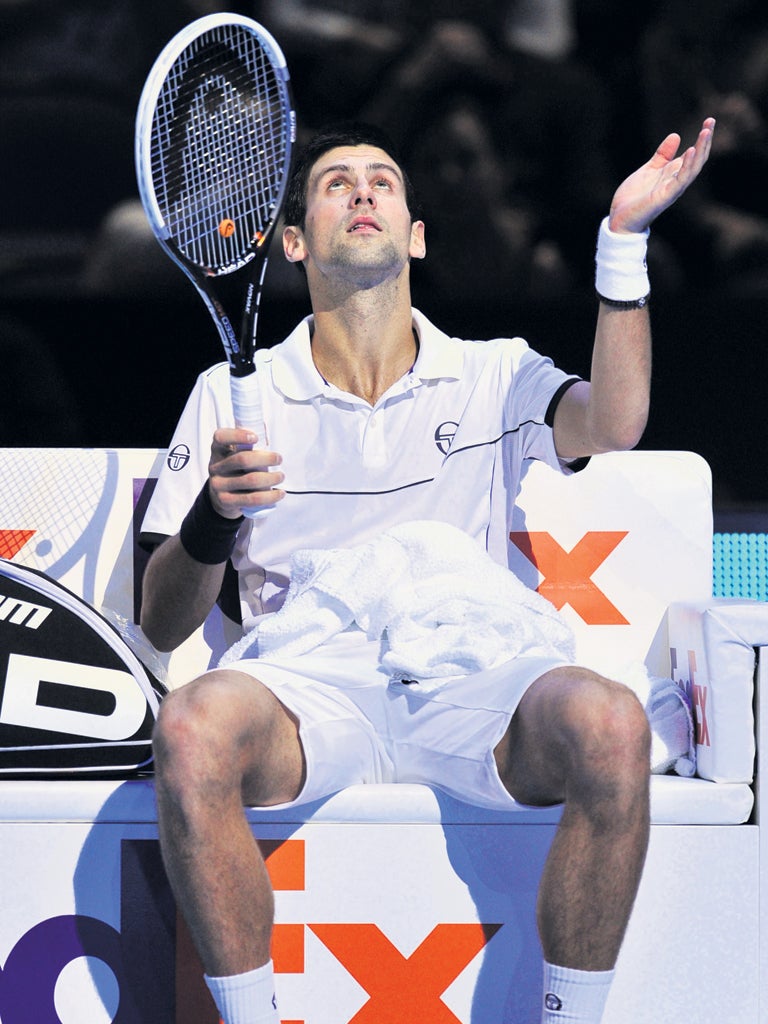'Overloaded' Djokovic completes top-three exit

Your support helps us to tell the story
From reproductive rights to climate change to Big Tech, The Independent is on the ground when the story is developing. Whether it's investigating the financials of Elon Musk's pro-Trump PAC or producing our latest documentary, 'The A Word', which shines a light on the American women fighting for reproductive rights, we know how important it is to parse out the facts from the messaging.
At such a critical moment in US history, we need reporters on the ground. Your donation allows us to keep sending journalists to speak to both sides of the story.
The Independent is trusted by Americans across the entire political spectrum. And unlike many other quality news outlets, we choose not to lock Americans out of our reporting and analysis with paywalls. We believe quality journalism should be available to everyone, paid for by those who can afford it.
Your support makes all the difference.For the last week Novak Djokovic’s focus has been on a blue court here on the Greenwich Peninsula at the Barclays ATP World Tour Finals. Now, at last, he can think about the blue seas of the Indian Ocean. His remarkable season over, the world No 1 is planning a holiday next week in the Maldives with his fellow Serb, Janko Tipsarevic, who in winning 3-6, 6-3, 6-3 here yesterday became the sixth and last man to beat the world No 1 this year.
Djokovic would still have qualified for today's semi-finals if David Ferrer had beaten Tomas Berdych, but it was the Czech who won 3-6, 7-5, 6-1 to earn a meeting in the last four with Jo-Wilfried Tsonga this evening. Ferrer faces Roger Federer in the first semi-final.
These season-ending championships, which bring together the year's eight most successful men, should be a celebration of the season, but the game's top three players, exhausted by a gruelling campaign, have won just two of their seven round-robin matches. Djokovic and Rafael Nadal won one apiece, while Andy Murray withdrew injured after losing first time out.
Nothing can detract from the brilliance of Djokovic's season, in which he has won 10 titles, including three Grand Slam tournaments, but the last two months have put a serious dent in his record. When he won the US Open in September Djokovic had lost just two matches in 2011, to Federer in the French Open semi-finals and to Murray in the final of the Cincinnati Masters. Since then he has lost to Juan Martin del Potro, Kei Nishikori, Ferrer and Tipsarevic.
If Djokovic performed better against Tipsarevic than he had against Ferrer, he still seemed a shadow of the man who has dominated this year. Laid low by injuries and looking worn out, the world No 1 has had good reason to lament the season's length.
"The body says that it's overload," Djokovic said. "It's been too much this year. Obviously mentally I feel a little bit drained as well. I just don't have that freshness in my mind for the matches."
Djokovic understood why Nadal, having gone out of the tournament at the hands of Tsonga on Thursday, talked afterwards about having felt "a little bit less passion for the game" in recent weeks, "probably because I was a little bit more tired than usual".
Nadal ended his post-match press conference by telling the media: "See you next year." However, he will not compete in Britain again until late June, having decided to prepare for Wimbledon by playing in Germany rather than at Queen's Club.
The Spaniard is one of those players unhappy at having to pay UK tax on a percentage of his worldwide deals. A report yesterday by the Bloomberg news agency said that in dropping Queen's from his schedule Nadal was expected to have to pay UK tax (at 50 per cent) on only 10 per cent of his global endorsements rather than 15 per cent. The world No 2 is said to earn more than $20.5m (£13.3m) a year from all his endorsements.
There are fears that Britain's tax regime – which Nadal describes as "a really negative factor" – could jeopardise London's chances of keeping the World Tour Finals once the present deal runs out in 2013. Other sports are also affected by the tax issue: the athlete Usain Bolt did not run at Crystal Palace last year, while a number of golfers do not compete in Britain other than at the Open.
Yesterday's report suggested that the tax brings in just £7m a year from foreign sportsmen and women. That figure is little more than one-tenth of the total of £68m in UK tax paid by overseas sports and entertainment figures on their global endorsements in 2009-10.
While many would argue that these big earners should pay tax like everyone else – especially as they should be able to claim relief in their own countries against any UK tax they pay – the revenue it generates seems paltry in comparison with the economic value that major sports events bring to the country. According to a report commissioned by the sponsors of the World Tour Finals, the tournament is worth as much as £100m a year to the British economy.
Join our commenting forum
Join thought-provoking conversations, follow other Independent readers and see their replies
Comments